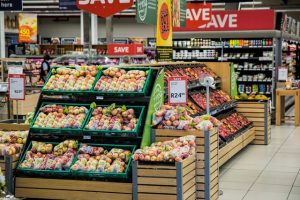 Concerns related to the forthcoming entrance of Amazon Fresh in 2018 are overplayed in the Australian supermarkets and grocery shops sector, based on a new study by IBISWorld.
Concerns related to the forthcoming entrance of Amazon Fresh in 2018 are overplayed in the Australian supermarkets and grocery shops sector, based on a new study by IBISWorld.
The study suggests that conventional bricks-and-mortar fresh food store vendors and internet grocery players won’t be as badly affected by Amazon as operators in other retailing businesses.
While Amazon Fresh will provide competitive pricing and apply the most recent technologies, the influence on the significant supermarket players will probably be mild in comparison with disruptions in additional retailing businesses, especially in the short to medium term.
The supermarkets and grocery business is expected to create earnings of $108 billion in 2017-18. In the current industry, internet shopping signifies an estimated 2.8 percent of earnings, at $3 billion. While the internet grocery sales sector is growing quickly, it’s anticipated to simply account for 4.3 percent of overall grocery store and grocery sales in 2022-23.
Online shopping experience is a lot lower in Australia than in other nations where Amazon has established its own grocery network. In the USA and the Britain, online supermarket sales accounts for roughly 6 percent of earnings. Australia’s prosperity of bricks-and-mortar supermarkets enables most customers to buy groceries quickly and readily in-store.
Major players like Coles and Woolworths possess the benefit of getting many physical places near customers. Furthermore, the significant supermarkets currently have the scale and logistical power to enlarge their internet capabilities through choices like click-and-collect.
Coles and Woolworths are increasingly expanding their internet presence in anticipation of Amazon’s arrival. By way of instance, Coles opened its initial online-only dark shop in inner-city Melbourne at June 2016 and IBISWorld expects more of them to be opened within the next five decades.
Coles and Woolworths currently dominates the internet grocery sales sector in Australia. Revenue generated through internet grocery sales is estimated to total $1.3 billion to Woolworths and $1.1 billion for Coles in 2017-18. While ALDI doesn’t sell groceries online from the site, it does sell grocery items online in China throughout the Tmall platform earlier this year indicates that the company recognises the expansion potential in internet supermarket sales. The business also sells wine and non-food lines through its site in a selection of countries, like the United Kingdom and Germany.
Amazon might need to conquer the established delivery and logistics networks managed by Wesfarmers and Woolworths, combined with the already lower prices provided by ALDI, to greatly outperforming the Australian grocery industry. Additionally, consumers often prefer to scrutinize new produce before buying, which rewards the significant supermarkets. Coles and Woolworths will also be improving the shopping experience for customers through add-ons like in-store tastings and cooking demonstrations.
It seems as if one year on from beginning in the fiercely competitive British supermarket industry, Amazon has yet to make its own mark. That is another positive indication for the significant supermarkets in Australia. But, Amazon may use their large buying power as a supermarket and launch an offline presence in Australia, very similar to that which they did with the Whole Foods Market in the USA. Additionally, with the growing popularity in take away and eating out at lunch cafes and other venues especially in metropolitan areas like Melbourne, expansion into the market is made even more difficult
Amazon Fresh is not likely to start in the New Zealand marketplace any time soon, because of the comparatively modest dimensions of the New Zealand sector in comparison with Australia. The supermarkets, grocery stores and convenience stores in New Zealand is forecast to complete NZD $18.7 billion, which is equal to about 17 percent of the Australian sector when converted into Australian dollars.

